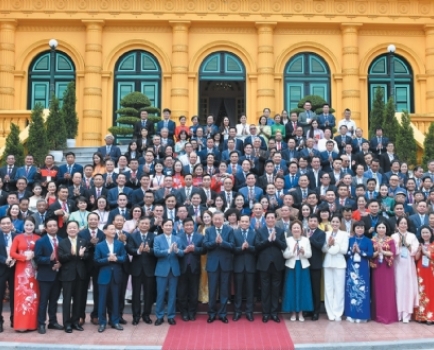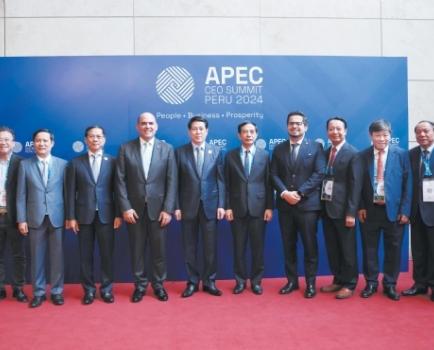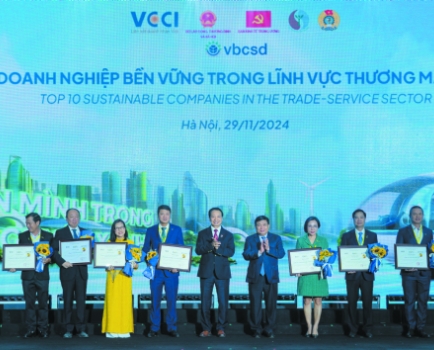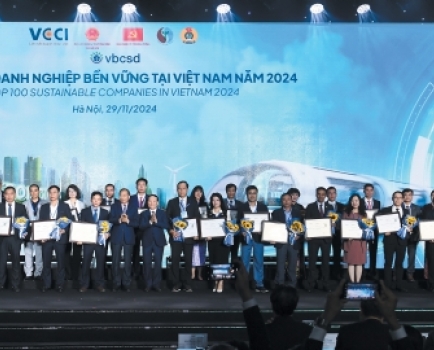Turning ESG Challenges into Opportunities
Mon, 30 Dec 2024 14:11:00 | Print | Email Share:
Amid global sustainable development and ESG (Environmental, Social and Governance) standards, Vietnamese businesses face challenges and opportunities. Mr. Nguyen Quang Vinh, Vice President of Vietnam Chamber of Commerce and Industry (VCCI) and Chairman of the Vietnam Business Council for Sustainable Development (VBCSD), shared insights on overcoming barriers and seizing opportunities in ESG implementation.
Why is ESG now a mandatory trend for businesses, and what opportunities can Vietnamese businesses capitalize on by advancing ESG initiatives?
Looking at global trends, it becomes clear why ESG has become essential for businesses. The European Union is leading the way with regulations like the Corporate Sustainability Reporting Directive (CSRD), which expands ESG reporting requirements to over 50,000 companies, along with frameworks such as the EU Taxonomy and Corporate Sustainability Due Diligence Directive (CSDDD) that shape sustainable economies and ensure accountability across global supply chains. In the United States, ESG has been strongly driven by investor demand, with the proportion of large listed companies publishing ESG reports reaching 100% by 2022. Despite ongoing debates, regulations from the Securities and Exchange Commission (SEC) and laws in states like California are reinforcing transparency and sustainable management.

Asian countries like Japan and China, and ASEAN are rapidly adopting ESG standards, creating pressure and opening up opportunities for Vietnamese businesses. ESG practices help build credibility, attract green investments, optimize costs, and meet the growing demand for sustainable products. ESG supports risk management, fosters an inclusive and cohesive work environment, and promotes community development, ensuring sustainable and long-term growth. This is the key for Vietnamese businesses to achieve deeper integration and assert their position in the international market.
How do you assess the current state of ESG practices among Vietnamese businesses?
Vietnam has made significant progress in ESG with strong commitments from the government. At COP26 in 2021, Prime Minister Pham Minh Chinh pledged to achieve net-zero emissions by 2050, laying the foundation for the country’s sustainable development strategy. Policies, such as Circular 96/2020/TT-BTC, Decision 167/QD-TTg, Circular 13/2023/TT-BKHDT, and Resolution 136/NQ-CP promote transparency and support sustainable business practices.
Resolution 136/NQ-CP and other legal documents emphasize the Corporate Sustainability Index (CSI), developed by VCCI, as an effective governance tool integrating ESG criteria. Regulations in the Securities Law, Decree 155/2020/ND-CP, the Environmental Protection Law, and the Labor Law mandate the disclosure of ESG-related indicators, creating a supportive and enabling environment for effective ESG implementation.
ESG awareness in Vietnam's business community has improved, but significant challenges remain. The 2024 “Assessment of Sustainable Business Practices Based on the ESG Framework” report by the Ministry of Planning and Investment and USAID shows 39% of businesses are unaware of ESG, and 62% lack clarity on related policies. Large enterprises lead in ESG adoption, while 26-30% of SMEs have started implementing ESG practices but need significant support to improve effectiveness.
Among the three ESG pillars, businesses perform best in the Social pillar (68%), followed by Governance (63%) and Environment (52%). Implementation levels generally increase with company size, as larger enterprises leverage their stronger resources to comply with and adopt ESG standards effectively, whereas smaller businesses face limitations in resources and capabilities.
I believe these figures accurately reflect the state of ESG adoption in Vietnamese businesses, even though progress remains slower compared to the global level. ESG investments are concentrated among multinational corporations, listed companies and consumer goods enterprises, driven by international pressures and market demand. However, with government support, green financing and the rising trend of sustainable consumption, ESG in Vietnam presents significant opportunities for growth.

VCCI has implemented many initiatives to support businesses in integrating ESG principles into their operations
In the photo: Most sustainable companies are honored with the CSI Awards 2024, a program initiated and developed by VBCSD-VCCI
What are the primary challenges that Vietnamese businesses face in implementing ESG practices, and what key recommendations have they proposed to enhance their effectiveness?
Surveys show Vietnamese businesses face key ESG challenges: lack of information, limited training programs, and no specific government support. They also struggle with securing investment, hiring specialized staff, and meeting ESG disclosure requirements.
To overcome these difficulties, businesses have proposed several priority recommendations to improve ESG practices. The top three concerns include having clear guidelines for ESG application, access to green loans from the government or other organizations, and tax reductions or exemptions for those committed to clear ESG objectives. These suggestions highlight the pressing need for transparent information and financial support to enable businesses to fully adopt ESG practices. These are both practical and essential recommendations.
What factors should businesses prioritize when implementing ESG practices?
ESG priorities should be tailored flexibly to the industry, scale, resources, and expectations of stakeholders. Businesses must focus on transparent and accountable governance, compliance with laws and international standards, and effective risk management with clear response plans. In terms of the environment, emphasis should be placed on reducing emissions, utilizing renewable energy, managing waste, and ensuring sustainable resource management. In the social pillar, developing human resources, promoting diversity and inclusion, maintaining community relations and supporting local economic growth are essential.
More importantly, businesses should adopt the principle of "double materiality" when setting goals, ensuring benefits both for the organization (business efficiency, risk management) and society (addressing urgent environmental and social issues). This approach not only optimizes resources but also creates long-term and sustainable value.
What initiatives has VCCI implemented to help businesses integrate ESG into their operations?
VCCI has consistently taken the lead in promoting sustainable production and business practices. To achieve green transformation and the Net Zero target, VCCI has been actively driving comprehensive change through policy recommendations, facilitating domestic and international trade connections, and developing and disseminating key indices such as the Provincial Green Index (PGI), the Sustainable Industrial Park Index (SIP Index), and especially the Corporate Sustainability Index (CSI).
Launched in 2016, the CSI serves as an effective governance tool, enabling Vietnamese businesses to incorporate ESG into their sustainable development strategies. Annually updated to align with legal changes and international standards, the CSI helps businesses self-assess, optimize operations, and develop effective action plans. VCCI also organizes the annual Sustainable Business Evaluation and Announcement Program, recognizing outstanding businesses in fields like circular economy, emission reduction, and promoting diversity and inclusion.
These efforts have been recognized by the Government, with the CSI being integrated into key policies such as Directive 13/CT-TTg, Decision 1362/QD-TTg and Resolution 136/NQ-CP. On an international scale, the CSI has become a legacy project of the ASEAN Business Advisory Council (ASEAN BAC), elevating the global standing of Vietnamese enterprises.
Thank you very much!
---------------------------------------------
Same category News :













